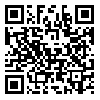Tue, Feb 3, 2026
Volume 35, Issue 3 (6-2025)
JHNM 2025, 35(3): 217-227 |
Back to browse issues page
Download citation:
BibTeX | RIS | EndNote | Medlars | ProCite | Reference Manager | RefWorks
Send citation to:



BibTeX | RIS | EndNote | Medlars | ProCite | Reference Manager | RefWorks
Send citation to:
Fathnezhad-Kazemi A, ranjbar M, Khalili F. Factors Impacting Anxiety Levels During Gynecological Examinations: The Role of Self-esteem, Coping Strategies. JHNM 2025; 35 (3) :217-227
URL: http://hnmj.gums.ac.ir/article-1-2224-en.html
URL: http://hnmj.gums.ac.ir/article-1-2224-en.html
1- Associate Professor, Department of Midwifery, TaMS.C., Islamic Azad University, Tabriz, Iran. , afnkazemi@gmail.com
2- Instructor, Department of Midwifery, TaMS.C., Islamic Azad University, Tabriz, Iran.
3- Medical Physician (MD), Department of Midwifery, TaMS.C., Islamic Azad University, Tabriz, Iran.
2- Instructor, Department of Midwifery, TaMS.C., Islamic Azad University, Tabriz, Iran.
3- Medical Physician (MD), Department of Midwifery, TaMS.C., Islamic Azad University, Tabriz, Iran.
Abstract: (692 Views)
Introduction: Gynecological examination is a crucial component of women’s gynecological care. However, women usually encounter discomfort and anxiety during these examinations.
Objective: This study aims to evaluate the experiences of women and investigate possible factors related to anxiety in women undergoing gynecological examinations.
Materials and Methods: A cross-sectional study was conducted on 270 women recruited using convenience sampling in 2022. They were referred to our hospital’s Obstetric and Gynecological Department and underwent a gynecological examination. Data were collected using demographic information questionnaires, Rosenberg’s Self-esteem Scale (RSES), coping strategies, and the Situational Anxiety Scale (SAS). The Pearson correlation was used to test the main hypotheses of the research, and analysis of variance and t-test were used to determine the relationship between demographic and obstetric variables, as well as the main research variables. Bivariate logistic regression with the “enter” method was used to investigate predictors of anxiety.
Results: The Mean±SD age of women was 38.03±9.05 years. About 67.2% had a high education, and the most common reason for referral was bleeding and related problems. Also, 85% of women felt ashamed during the gynecological examination. Their mean SAS score was 50±11.72. There was a significant inverse correlation between self-esteem (r=0.441, P=0.001) and coping strategies (r=-0.357, P=0.001) with situational anxiety. Based on the bivariate logistic regression analysis, self-esteem (OR=0.86, 95% CI, 0.80, 0.93, P=0.001), coping strategies (OR=0.95, 95% CI, 0.94, 0.97, P=0.001), and education levels (OR=0.20, 95% CI, 0.06, 0.60, P=0.001) could explain anxiety changes.
Conclusion: Considering that self-esteem, coping strategies, and educational attainment can affect the anxiety levels experienced during gynecological examinations, healthcare professionals must be aware of this problem. Healthcare workers might need to reevaluate their approach to gynecological and obstetric examinations.
Objective: This study aims to evaluate the experiences of women and investigate possible factors related to anxiety in women undergoing gynecological examinations.
Materials and Methods: A cross-sectional study was conducted on 270 women recruited using convenience sampling in 2022. They were referred to our hospital’s Obstetric and Gynecological Department and underwent a gynecological examination. Data were collected using demographic information questionnaires, Rosenberg’s Self-esteem Scale (RSES), coping strategies, and the Situational Anxiety Scale (SAS). The Pearson correlation was used to test the main hypotheses of the research, and analysis of variance and t-test were used to determine the relationship between demographic and obstetric variables, as well as the main research variables. Bivariate logistic regression with the “enter” method was used to investigate predictors of anxiety.
Results: The Mean±SD age of women was 38.03±9.05 years. About 67.2% had a high education, and the most common reason for referral was bleeding and related problems. Also, 85% of women felt ashamed during the gynecological examination. Their mean SAS score was 50±11.72. There was a significant inverse correlation between self-esteem (r=0.441, P=0.001) and coping strategies (r=-0.357, P=0.001) with situational anxiety. Based on the bivariate logistic regression analysis, self-esteem (OR=0.86, 95% CI, 0.80, 0.93, P=0.001), coping strategies (OR=0.95, 95% CI, 0.94, 0.97, P=0.001), and education levels (OR=0.20, 95% CI, 0.06, 0.60, P=0.001) could explain anxiety changes.
Conclusion: Considering that self-esteem, coping strategies, and educational attainment can affect the anxiety levels experienced during gynecological examinations, healthcare professionals must be aware of this problem. Healthcare workers might need to reevaluate their approach to gynecological and obstetric examinations.
Article Type : Research |
Subject:
General
Received: 2023/09/14 | Accepted: 2025/03/28 | Published: 2025/06/10
Received: 2023/09/14 | Accepted: 2025/03/28 | Published: 2025/06/10
Send email to the article author
| Rights and permissions | |
 | This work is licensed under a Creative Commons Attribution-NonCommercial 4.0 International License. |






